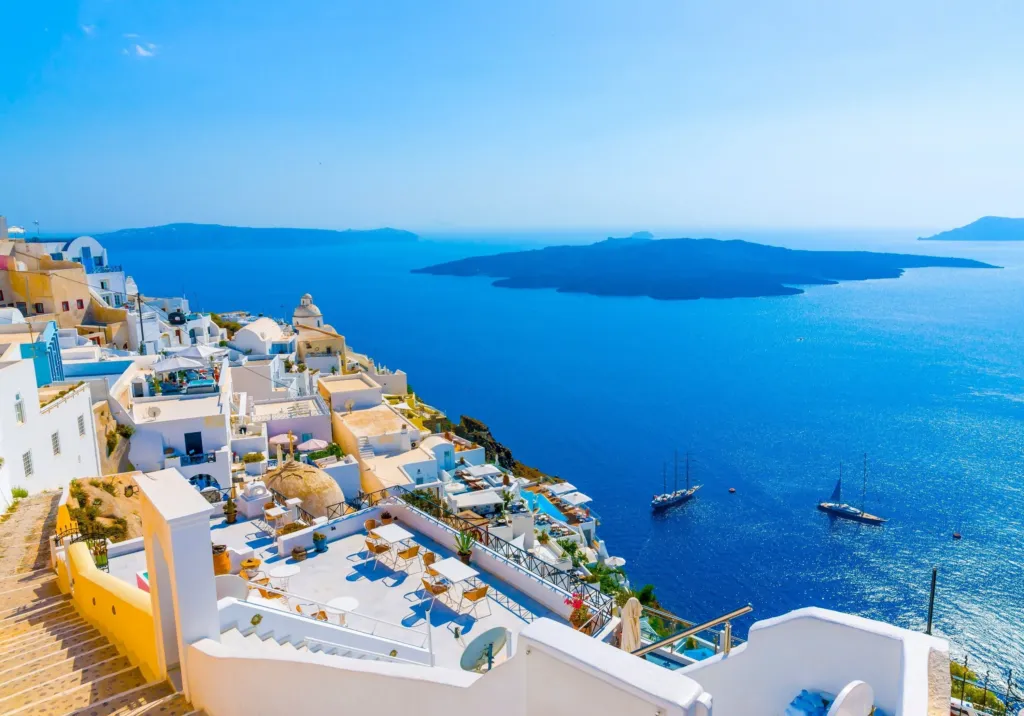Greece is a parliamentary republic in southern Europe at the crossroads of Europe, Asia and Africa. It occupies the southern Balkan Peninsula and thousands of islands across the Aegean, Ionian and Mediterranean seas. The mainland is mountainous, capped by Mount Olympus at 2,917 m, while islands range from volcanic Santorini to forested Corfu and rugged Crete. The name Hellas comes from the ancient Hellenes, while Greece is the Latin derived exonym. The country’s population is about 10.4 million, with Athens as the capital and Thessaloniki the second city. Greek is the official language, and English is widely spoken in tourism. National symbols include the blue and white flag and the Byzantine double headed eagle used by the Church. Legal gambling is regulated, with state supervised lotteries, betting and licensed casinos such as Loutraki and Parnitha. The head of state is the President, while the Prime Minister leads the government and unicameral Hellenic Parliament. The Hellenic Armed Forces maintain conscription for men with service typically 9 to 12 months, and Greece is a NATO and EU member using the euro.
History
Human presence in Greece reaches back to Paleolithic times, but the Minoan civilization on Crete and the Mycenaean civilization on the mainland formed the Bronze Age foundations of Greek culture. The Minoans built palaces at Knossos and Phaistos and traded widely. Mycenaeans left fortified citadels at Mycenae and Tiryns and epic memories preserved in the Iliad and Odyssey. After a Late Bronze Age collapse around the 12th century BCE, Greek societies reconfigured during the Early Iron Age and Archaic period. City states like Athens, Sparta, Corinth and Thebes emerged with unique political systems, from Sparta’s militarized dual kingship to Athenian democracy. Colonization spread Greek culture around the Mediterranean and Black Sea, and the Greek alphabet developed from Phoenician script.
In the 5th century BCE, the Persian Wars saw Greek city states unite to repel invasions at Marathon, Salamis and Plataea. Athens led the Delian League and entered a Golden Age under Pericles, building the Parthenon and nurturing drama, philosophy and history with figures like Aeschylus, Sophocles, Euripides, Herodotus and Thucydides. The Peloponnesian War between Athens and Sparta ended Athenian dominance and ushered in shifting hegemony. In the 4th century BCE, Macedon rose under Philip II, and his son Alexander the Great created a vast empire that spread Hellenistic culture from Egypt to India, blending Greek and local traditions in art, science and governance.
Rome absorbed the Hellenistic kingdoms by the 2nd century BCE, and Greece became integral to the Roman world, contributing language, education and philosophy. After the division of the Empire, the Greek speaking Byzantine Empire endured for a millennium with Constantinople as its capital, preserving Orthodox Christianity and classical learning. In 1453 the city fell to the Ottomans. Most Greek lands passed under Ottoman rule, though Venetian held pockets remained in the islands and west. Over centuries, Orthodox faith, language and community structures sustained a Greek identity despite heavy taxation, Janissary levies and periodic uprisings.
The Greek War of Independence began in 1821, inspired by Enlightenment ideas and supported by Philhellenes abroad. After brutal fighting and massacres on both sides, Great Power intervention helped secure an independent Kingdom of Greece in the 1830s, initially under a Bavarian dynasty and later the Glücksburgs. Through the 19th and early 20th centuries, Greece expanded to incorporate Thessaly, Epirus, Macedonia, Crete and Aegean islands, especially after the Balkan Wars of 1912 to 1913. The catastrophic Greco Turkish War of 1919 to 1922 ended with the Asia Minor Catastrophe, a massive population exchange between Greece and Turkey that reshaped society and cities like Thessaloniki and Athens with refugees.
During World War II, Italy invaded in 1940 but was repelled in Epirus before Germany occupied Greece in 1941. Famine, repression and a strong resistance movement followed. Liberation in 1944 was quickly overshadowed by the Greek Civil War, pitting government forces against communist led partisans until 1949, leaving deep political scars. Postwar decades brought reconstruction, migration, urbanization and political instability, culminating in a military junta ruling from 1967 to 1974. The fall of the dictatorship after the Cyprus crisis restored democracy and a new constitution. Greece joined the European Communities in 1981 and the eurozone in 2001.
The early 21st century saw the 2004 Olympic Games return to Athens, modernizing infrastructure. The global financial crisis triggered a severe debt crisis, with austerity, protests and reforms dominating the 2010s. Despite hardship, tourism, shipping and a resilient small business culture kept society moving. Recent years brought recovery, investment in renewables and technology, and challenges from wildfires, migration pressures and regional tensions. Yet the throughline remains a vibrant culture that fuses antiquity and modernity, from festivals and name days to contemporary art, gastronomy and entrepreneurial energy.
Industry
Greece’s economy rests on services, tourism and shipping, with industry focused on food and beverages, refined petroleum, chemicals, pharmaceuticals, textiles, metals and cement. Greek owned fleets constitute one of the largest merchant marine capacities in the world. Agrifood brands export olive oil, table olives, feta and yogurt, with companies like FAGE and Dodoni prominent. Beverage and spirits brands include ouzo from Lesvos and tsipouro from Thessaly, while Greek wineries have elevated native grapes such as Assyrtiko, Xinomavro and Agiorgitiko. Energy includes oil refining hubs near Athens and Thessaloniki and growing wind and solar power. Tech and logistics are expanding around Athens and Thessaloniki’s port, which is a regional gateway. Crete and the Peloponnese support fresh produce and greenhouse cultivation, while aluminum and bauxite mining, nickel and marble extraction continue. Shipyards at Skaramagas and Elefsina and maintenance at Perama support maritime industries.
Flora and fauna
Greece hosts rich Mediterranean biodiversity from maquis shrublands of olive, carob and lentisk to pine forests and alpine meadows. Endemics include flora on isolated islands and mountains, with many orchids and rare tulips. Fauna ranges from monk seals and loggerhead sea turtles on the coasts to brown bears and wolves in northern ranges like Pindus and Rhodope. Vipers and scorpions exist but are generally shy, and jellyfish blooms are occasional in summer. Protected areas include national parks such as Vikos Aoos, Olympus and Samaria Gorge. Export of antiquities and certain wildlife is strictly prohibited, and pets can enter under EU rules with microchip, vaccinations and paperwork.
Religion and races
The majority identify with the Greek Orthodox Church, which is influential in cultural life, rites of passage and the calendar. Muslim minorities are recognized in Thrace, and there are Catholic, Protestant and Jewish communities, alongside growing numbers of non religious residents and immigrants from the Balkans, Middle East and Asia. Name day celebrations, Easter customs like dyeing red eggs and midnight processions and village panigyria remain strong traditions that bind communities.
Wars and conflicts
Modern conflict on Greek soil centers on the 20th century occupation and civil war, memorialized by monuments and cemeteries nationwide. Greece contributes to NATO and EU missions and maintains a strong deterrent posture in the Aegean amid longstanding disputes with Turkey over airspace and maritime zones. Domestically, terrorism peaked with groups like November 17 in late 20th century but is now sporadic and low level. War graves, resistance museums and sites like Kalavryta and Distomo commemorate wartime atrocities.
Standard of living
Greece ranks high on human development with universal healthcare access and strong family and community networks. After the debt crisis, employment and incomes have been recovering, though youth unemployment remains a challenge. Corruption perceptions have improved but still sit mid table in the EU. Urban centers offer vibrant culture and services, while islands balance seasonal prosperity with off season quiet.
Healthcare
The National Health System provides public care supported by private clinics. Major hospitals are concentrated in Athens and Thessaloniki, with regional hospitals in larger towns and island facilities supplemented by medical evacuation when needed. Pharmacies keep standard hours with duty rosters for nights and weekends posted on doors and online. EU citizens can use the European Health Insurance Card, and all visitors should carry travel insurance. Tap water is generally safe on the mainland and larger islands, though bottled water is recommended on some smaller islands.
Sport
Football and basketball dominate, with clubs like Olympiacos, Panathinaikos, AEK and PAOK and elite Euroleague pedigree. Athletics, water polo, volleyball, tennis and sailing are widely practiced. Greece hosted the first modern Olympics in 1896 and the 2004 Summer Olympics. Trail running, windsurfing and diving thrive thanks to varied terrain and long coastlines.
Holidays
Key national holidays include New Year on 1 January, Epiphany on 6 January, Independence Day and the Annunciation on 25 March, Labor Day on 1 May, Assumption on 15 August, Ohi Day on 28 October and Christmas on 25 December. Orthodox Easter is the most important religious celebration with moving dates, preceded by Clean Monday and Holy Week and followed by Bright Monday. Many regions observe local saint days and fair like festivals.
Traditions
Hospitality or filoxenia is a core value, expressed through shared meals and generosity. Name days often matter more than birthdays. In churches and monasteries, modest dress and quiet respect are expected. Do not make the moutza palm forward gesture, which is offensive. Mealtime is a social ritual, with leisurely dinners often starting late, and coffee culture is strong.
Interesting facts
UNESCO World Heritage Sites abound, including the Acropolis of Athens, Delphi, Olympia, Mycenae and Tiryns, Epidaurus, Meteora, Mystras, the Medieval City of Rhodes, Corfu Old Town, Delos, the Monastery of St John on Patmos, Aigai at Vergina and Philippi. Films like For Your Eyes Only at Meteora, Captain Corelli’s Mandolin on Kefalonia, The Big Blue on Amorgos and Mamma Mia on Sporades showcased landscapes. The Corinth Canal slices a narrow isthmus linking seas. The Athens Metro unveiled archaeological finds during construction. Greece experiences earthquakes and wildfires, including the 1999 Athens quake and the 2018 Mati fire, and a major train crash occurred in 2023 near Tempi. Notable Greeks include Maria Callas, Melina Mercouri, Mikis Theodorakis and Giannis Antetokounmpo.
Money
The currency is the euro. Cards and contactless payments are widely accepted, though small cash is useful in villages and markets. ATMs are common in cities and on popular islands. Exchange rates to the US dollar fluctuate, so check current figures. For best value, pay in local currency and decline dynamic currency conversion. Tipping is not obligatory but rounding up or leaving 5 to 10 percent for good service is appreciated, and a small cover charge often appears on bills.
Household details
Electricity is 230V 50Hz with type C and F plugs. Mobile networks provide strong 4G and expanding 5G in cities, with island coverage varying. Smoking is banned in indoor public spaces, with enforcement much improved. Siesta habits persist, influencing shop hours outside tourist zones.
Clothing
Dress is casual and climate driven. In summer, light breathable fabrics, sunhat and sunglasses are essential. Swimwear is for beaches and pools, not towns. In churches and monasteries, cover shoulders and knees. Spring and autumn require a light jacket, while winter in the north needs warmer layers.
Tourism
Plan at least 3 to 4 days for Athens and a day trip, 7 to 10 days for Athens plus one or two islands or a mainland loop and 14 to 21 days for a balanced mix of mainland classics and island hopping. Popular circuits include Athens, Delphi and Meteora, or Athens with a Cyclades duo like Santorini and Naxos. Crete merits a week on its own for Knossos, Heraklion museums, Samaria Gorge, Chania and beaches. The Peloponnese offers Mycenae, Epidaurus, Nafplio, Monemvasia, Mani towers and Olympia. Northern Greece mixes Thessaloniki’s food culture with Mount Olympus, Halkidiki beaches, Zagori stone villages and Prespa lakes. Peak season is June to September, with crowds and heat, while May to early June and September to October offer warm seas and milder weather. Winter brings quiet islands and cultural city breaks. Book ferries and hotels early in summer, reserve timed entry where available and start popular sites early or late to avoid heat and queues.
Types of tourism
Beach and island holidays, cultural and archaeological touring, religious pilgrimage, sailing and yachting, hiking and nature, gastronomy and wine, city breaks, wellness and spa, diving and watersports, conference and incentive travel.
List of tourist attractions
— Acropolis of Athens and its museum — classical temples crowning the city, UNESCO
— Delphi — sanctuary of Apollo and the oracle on Mount Parnassus, UNESCO
— Meteora — monasteries perched atop sandstone pillars, UNESCO
— Ancient Olympia — birthplace of the Olympic Games in the Peloponnese, UNESCO
— Mycenae and Tiryns — Bronze Age citadels of the Mycenaean world, UNESCO
— Epidaurus — ancient theatre famed for acoustics and healing sanctuary, UNESCO
— Medieval City of Rhodes — walled old town of the Knights Hospitaller, UNESCO
— Corfu Old Town — Venetian lanes, fortresses and Liston arcades, UNESCO
— Santorini caldera and Oia — volcanic cliffs, blue domes and sunsets
— Delos — sacred island with extensive ruins in the Cyclades, UNESCO
— Monastery of St John and Cave of the Apocalypse, Patmos — pilgrimage site, UNESCO
— Thessaloniki Roman and Byzantine monuments — arches, churches and walls, UNESCO serial components
— Mount Olympus National Park — mythic home of the gods with alpine trails
— Knossos and Heraklion Archaeological Museum, Crete — Minoan palace and artifacts
— Nafplio and Palamidi — elegant first capital with fortress views
List of non tourist attractions
— Prespa lakes hamlets — quiet border villages, birdlife and Byzantine chapels
— Zagori lesser known bridges — stone spans like Plakidas away from busier routes
— Evros Delta — wetlands and hides far from crowds
— Kaisariani Monastery forest, Hymettus — serene trails above Athens on weekdays
— Messolonghi lagoon salt pans — reflective landscapes and fishing huts
— Lavrion Technological Cultural Park — industrial archaeology of ancient and modern mines
Local cuisine
Greek cuisine celebrates seasonality and shared plates. Classics include horiatiki salad with tomatoes, cucumber, olives and feta, grilled souvlaki skewers, gyros, moussaka, spanakopita and dolmades. Islands add specialties like Santorini fava, Naxos potatoes, Crete’s dakos and kalitsounia, and Cycladic caper salads. Seafood shines with grilled octopus, sardines and lobster pasta. Desserts range from baklava to galaktoboureko and loukoumades. Wines spotlight Assyrtiko, Moschofilero, Agiorgitiko and Xinomavro, while ouzo, tsipouro and Cretan raki appear as aperitifs or digestifs. Lunch runs from 13:00 to 15:00, dinner often from 20:00 onward. Tipping is modest and optional, and food safety standards are high. Tap water is generally safe in cities but ask locally on islands.
Why visit
Greece offers an unrivaled blend of ancient sites, island landscapes, warm seas, mountain villages and a living culture of music, food and hospitality. You can stand in a 2,500 year old theatre at noon and swim in turquoise water by sunset.
Safety for tourists
Greece is generally safe. Petty theft can occur in crowded areas and on public transport, so use common sense and anti theft bags. Summer heat and sun exposure are bigger risks, along with strong meltemi winds at sea. In nature, watch for slippery rocks, sea urchins and occasional jellyfish and be mindful of vipers in remote hills. Wildfires can impact travel in dry months. Public health is good, with occasional seasonal mosquito borne infections. The single European emergency number is 112. Society is welcoming to visitors of all backgrounds, and CCTV is present in transport and busy zones.
Tourist infrastructure level
Hotels range from family run pensions to global luxury brands. Tavernas and cafes are ubiquitous, and service tends to be friendly and informal. English is widely spoken in tourism, with French, German, Italian and Russian often understood in resort areas. Ferries and airports connect the islands efficiently in season.
Entry rules
Greece is in the Schengen Area. EU and certain other nationals enjoy visa free entry for short stays, while others require a Schengen visa. Passports must be valid for the required period and may be stamped on entry and exit. Customs follow EU allowances. Export of antiquities is illegal without permits. Drones require registration and adherence to aviation rules, with additional restrictions around archaeological sites, airports and military areas.
Transport
Athens has a modern metro, suburban rail, buses and trams, with rechargeable cards. Thessaloniki operates buses and is rolling out metro service. Intercity buses under the KTEL network connect towns where trains are limited, while the main rail line links Athens, Larissa and Thessaloniki with extensions to the north. Ferries run from Piraeus, Rafina and Lavrio to islands, and between islands in season. Taxi apps and metered taxis are common in cities, with airport flat fares published. Tickets are easily bought at stations, agencies and online.
Car
Renting a car is ideal for Peloponnese, Crete, mainland mountains and larger islands. Driving is on the right. Typical limits are 50 km h in towns, 90 km h on open roads and 110 to 130 km h on motorways. Highways use electronic and staffed tolls. The blood alcohol limit is 0.05, lower for new drivers. Cameras and police enforce speeds and seatbelts. Bribery is not part of policing. City parking is scarce and regulated by colored zones and private garages. Mountain and island roads can be narrow with sharp bends and goats or sheep. Winter chains may be required in northern mountains. An IDP is recommended for non EU licenses. A compact car or small SUV suits most routes, and dashcams are generally legal.
Noise regime
Quiet hours usually apply midday and in late night to early morning, with seasonal variation. In residential areas, keep noise down after about 23:00 and during afternoon rest. Respect hotel and local notices.
Daily budget
Budget travelers can manage on 60 to 90 EUR per day with hostels, simple tavernas and public transport. Midrange comfort with hotels, some taxis and paid sights runs 120 to 200 EUR. High end stays, fine dining and private boats easily exceed 250 to 400 EUR. In US dollars, these ranges vary with exchange rates.
What is not recommended or prohibited
Do not remove or buy antiquities without documentation. Do not fly drones near archaeological sites or airports without authorization. Avoid photographing military facilities. Dress modestly in religious sites and follow beach codes outside designated naturist areas. Observe fire bans, respect protected areas and do not feed wildlife. Validate tickets and keep them until the end of a ride to avoid fines.
Climate
Greece has a Mediterranean climate with hot dry summers and mild wetter winters. Islands and coasts enjoy sea breezes, central plains are hotter and northern and highland regions see snow in winter. Best overall times are May to June and September to October for warm seas, manageable heat and fewer crowds. July and August bring peak crowds and high temperatures, while November to March suits culture and hiking in cooler air, with some island services reduced.
Tips for tourists
Protect against sun and heat with hats, sunscreen and water. Pre book summer ferries, popular hotels and time slots for headline sights. Start early to beat heat and queues. Carry some cash for rural areas. Watch for transport strikes and build buffer time. Wear reef shoes where sea urchins are common. Standard vaccinations suffice, with mosquito repellent useful. Learn a few Greek phrases and greet people warmly to open doors.
- Norway’s Atlantic Road scenic drive
- Chukchi
- The Wettest Places on Earth: Where the Sky Almost Never Dries
- Mammoths and travel: where to see habitats, traces and digs, and museums
- Traveling to Russia
- Nicaragua
- Macau
- Birds
- The World of Varans
- Haiti, unfiltered: how to travel smart and fall in love with the country
- How a traveler can earn on the road
- Teatime at Cape Town’s 5‑Star Mount Nelson Hotel
- Chechnya
- Win a four-night Greek getaway for two in one of the most stylish resorts in the Aegean courtesy of Sani Resort
- Panama
- The September 11 Terrorist Attack: How the Tragedy Changed Tourism
- Rising prices for travel in Germany in 2025: reasons, scale and consequences
- Brest (Belarus)
- Finland
- Tourist safety in Bukhara: how to spot and avoid crime











